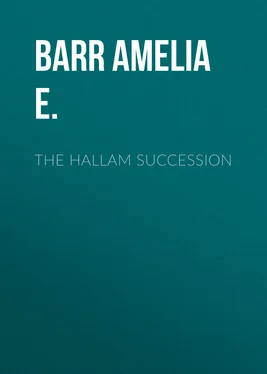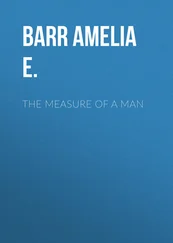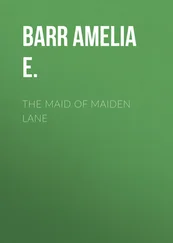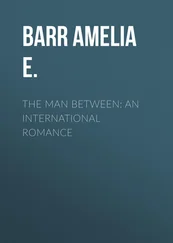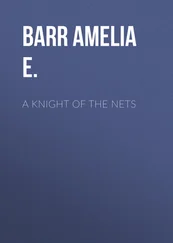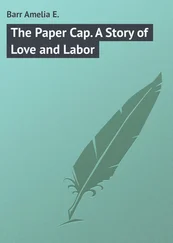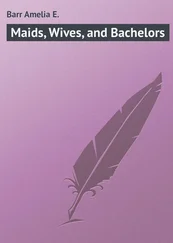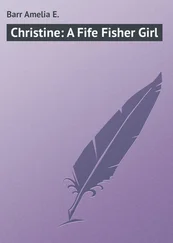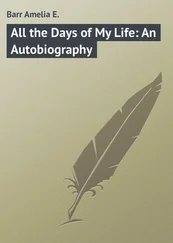Amelia Barr - The Hallam Succession
Здесь есть возможность читать онлайн «Amelia Barr - The Hallam Succession» — ознакомительный отрывок электронной книги совершенно бесплатно, а после прочтения отрывка купить полную версию. В некоторых случаях можно слушать аудио, скачать через торрент в формате fb2 и присутствует краткое содержание. Жанр: foreign_prose, foreign_antique, на английском языке. Описание произведения, (предисловие) а так же отзывы посетителей доступны на портале библиотеки ЛибКат.
- Название:The Hallam Succession
- Автор:
- Жанр:
- Год:неизвестен
- ISBN:нет данных
- Рейтинг книги:5 / 5. Голосов: 1
-
Избранное:Добавить в избранное
- Отзывы:
-
Ваша оценка:
- 100
- 1
- 2
- 3
- 4
- 5
The Hallam Succession: краткое содержание, описание и аннотация
Предлагаем к чтению аннотацию, описание, краткое содержание или предисловие (зависит от того, что написал сам автор книги «The Hallam Succession»). Если вы не нашли необходимую информацию о книге — напишите в комментариях, мы постараемся отыскать её.
The Hallam Succession — читать онлайн ознакомительный отрывок
Ниже представлен текст книги, разбитый по страницам. Система сохранения места последней прочитанной страницы, позволяет с удобством читать онлайн бесплатно книгу «The Hallam Succession», без необходимости каждый раз заново искать на чём Вы остановились. Поставьте закладку, и сможете в любой момент перейти на страницу, на которой закончили чтение.
Интервал:
Закладка:
Amelia E. Barr
The Hallam Succession
CHAPTER I
"The changing guests, each in a different mood,
Sit at the road-side table and arise:
And every life among them in likewise
Is a soul's board set daily with new food.
"May not this ancient room thou sitt'st in dwell
In separate living souls for joy or pain?
Nay, all its corners may be painted plain
Where Heaven shows pictures of some life well-spent."
Yorkshire is the epitome of England. Whatever is excellent in the whole land is found there. The men are sturdy, shrewd, and stalwart; hard-headed and hard-fisted, and have notably done their work in every era of English history. They are also a handsome race, the finest specimens extant of the pure Anglo-Saxon, and they still preserve the imposing stature and the bright blonde characteristics of the race.
Yorkshire abounds in what is the typical English home—fine old halls and granges, set in wooded parks, and surrounded by sweet, shady gardens. One of the fairest of these homes is Hallam-Croft. There may be larger halls in the West Riding, but none that combines so finely all the charms of antiquity, with every modern grace and comfort. Its walls are of gray stone, covered with ivy, or crusted with golden lichens; its front, long and low, is picturesquely diversified with oriel windows, gable ends, and shadowy angles. Behind is a steep, craggy range of woody hills; in front, a terraced garden of great extent; full of old-fashioned bowers, and labyrinth-like walks, and sloping down to a noble park, whose oaks and beeches are of wonderful beauty, and whose turf is soft as velvet and greener than any artist ever dreamed of.
Fifty years ago the owner of this lovely spot was Squire Henry Hallam. He was about sixty years of age, stout and fair and dressed in fine drab broad-cloth, with a white vest, and a white cambric kerchief tied loosely round his neck. His hat, drab also, was low-crowned and broad-brimmed, and, as a general rule, he kept it on. In the holy precincts of a church, or if the national anthem was played, he indeed always bared his head; but, in the first case, it was his expression of a religious sentiment, in the second he saluted his country, and, in a measure, himself.
One evening in the early spring he was sitting upon a low sofa in the room that was specially his own, mending some fishing tackle. A couple of setter puppies were worrying each other on the sofa beside him, and a splendid fox-hound leaned her muzzle on one of his broad knees, and looked up into her master's face with sad reproachful eyes. She was evidently jealous, and watching anxiously for some look or word of favor. She had not long to wait. The puppies became troublesome; he chided them, and put the bit of leather they were quarreling about in his pocket. Then he patted the hound, and said: "There's a deal o' difference between them and thee, Fanny, and it's a' in thy favor, lass;" and Fanny understood the compliment, for she whimpered happily, and thrust her handsome head up against her master's breast.
At that moment his daughter, Elizabeth, entered the room. She had an open letter in her hand, and a look half-perplexed and half-pleased upon her face. "Father," she said, "there is a letter from America; Richard and Phyllis are coming; and I am afraid I shall not know how to make them happy."
"Don't thee meet troubles half 'way; they arn't worth th' compliment. What is ta feared for, dearie?"
"Their life is so different from ours—and, father, I do believe they are Methodists."
The squire fastened the bit of gaudy feather to the trout "fly" he was making, before he answered. "Surely to goodness, they'll nivver be that! Sibbald Hallam, my uncle, was a varry thick Churchman when he went to th' Carolinas—but he married a foreigner; she had plenty o' brass, and acres o' land, but I never heard tell owt o' her religion. They had four lads and lasses, but only one o' them lived to wed, and that was my cousin, Matilda Hallam—t' mother o' these two youngsters that are speaking o' coming here."
"Who did she marry, father?"
"Nay, I knowt o' th' man she married. He was a Colonel Fontaine. I was thinking a deal more o' my own wedding than o' hers at that time. It's like enough he were a Methodist. T' Carolinas hed rebelled against English government, and it's nobbut reasonable to suppose t' English Church would be as little to their liking. But they're Hallams, whativer else they be, Elizabeth, and t' best I hev is for them."
He had risen as he spoke; the puppies were barking and gamboling at his feet, and Fanny watching his face with dignified eagerness. They knew he was going to walk, and were asking to go with him. "Be still wi' you, Rattle and Tory!—Yes, yes, Fanny!—and Elizabeth, open up t' varry best rooms, and give them a right hearty welcome. Where's Antony?"
"Somewhere in the house."
"Hedn't ta better ask him what to do? He knows ivery thing."
There was a touch of sarcasm in the voice, but Elizabeth was too much occupied to notice it; and as the squire and his dogs took the road to the park, she turned, with the letter still open in her hand, and went thoughtfully from room to room, seeking her brother. There was no deeper motive in her thought than what was apparent; her cares were simply those of hospitality. But when a life has been bounded by household hopes and anxieties, they assume an undue importance, and since her mother's death, two years previously, there had been no company at Hallam. This was to be Elizabeth's first effort of active hospitality.
She found Antony in the library reading "The Gentleman's Magazine," or, perhaps, using it for a sedative; for he was either half asleep, or lost in thought. He moved a little petulantly when his sister spoke. One saw at a glance that he had inherited his father's fine physique and presence, but not his father's calm, clear nature. His eyes were restless, his expression preoccupied, his manner haughty. Neither was his voice quite pleasant. There are human instruments, which always seem to have a false note, and Antony's had this peculiarity.
"Antony, I have a letter from Richard and Phyllis Fontaine. They are going to visit us this summer."
"I am delighted. Life is dreadfully dull here, with nothing to do."
"Come to the parlor, and I will give you a cup of tea, and read you cousin Phyllis's letter."
The squire had never thought of asking Elizabeth why she supposed her cousins to be Methodists. Antony seized at once upon the point in the letter which regarded it.
"They are sailing with Bishop Elliott, and will remain until September, in order to allow the Bishop to attend Conference; what does that mean, Elizabeth?"
"I suppose it means they are Methodists."
The young man was silent a moment, and then he replied, emphatically, "I am very glad of it."
"How can you say so, Antony? And there is the rector, and the Elthams—"
"I was thinking of the Hallams. After a thousand years of stagnation one ought to welcome a ripple of life. A Methodist isn't asleep. I have often felt inclined to drop into their chapel as I passed it. I wonder how it would feel to be awake soul and body at once!"
"Antony, you ought not to talk so recklessly. Some people might imagine you meant what you said. You know very well that the thousand years of 'stagnation,' as you call it, of the Hallams, is a most respectable thing."
"Very respectable indeed! That is all women think about—born conservatives every one of them—'dyed in the wool,' as a Bradford man would say."
"Why do you quote what Bradford men say? I cannot imagine what makes you go among a crowd of weavers, when you might be at Eltham Castle with gentlemen."
"I will tell you why. At Eltham we yawn and stagnate together. The weavers prick and pinch me in a thousand places. They make me dream of living."
Читать дальшеИнтервал:
Закладка:
Похожие книги на «The Hallam Succession»
Представляем Вашему вниманию похожие книги на «The Hallam Succession» списком для выбора. Мы отобрали схожую по названию и смыслу литературу в надежде предоставить читателям больше вариантов отыскать новые, интересные, ещё непрочитанные произведения.
Обсуждение, отзывы о книге «The Hallam Succession» и просто собственные мнения читателей. Оставьте ваши комментарии, напишите, что Вы думаете о произведении, его смысле или главных героях. Укажите что конкретно понравилось, а что нет, и почему Вы так считаете.
